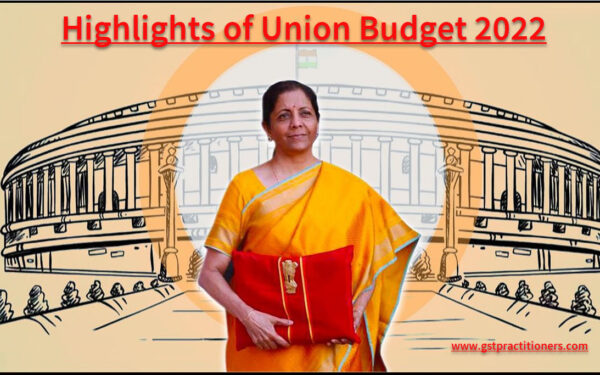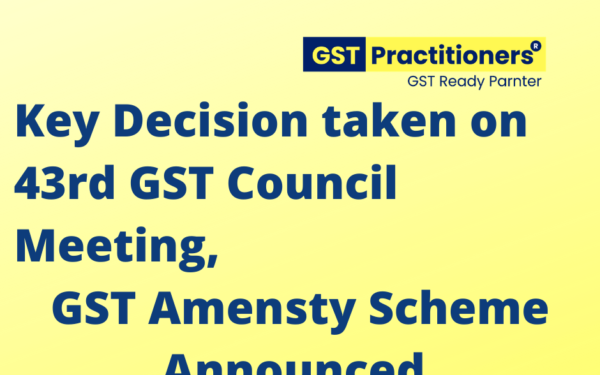GST Annual return and Reconciliation Statement filing due date further extended till 30th September’2020 [Read all Notification ]
![GST Annual return and Reconciliation Statement filing due date further extended till 30th September’2020 [Read all Notification ]](https://www.gstpractitioners.in/blog/wp-content/uploads/2020/05/Tiffs-Beauty-Lounge-5.png)
The Ministry has also notified extending the validity of e-way bill, expiring between March 20-April15, till May 31. This will facilitate smooth movement of trucks stranded at various places all across the country post announcement of lockdown.
Central Board of Indirect Taxes and Customs (CBIC) notified five changes important from the point of compliance. All these intend to provide relief to various categories of GST assesses.
GST Annual Returns & Reconciliation Statement for fy:2018-2019
CBIC issued notification no.Notification No. 41/2020 – Central Tax , permitted assesses to file annual return for fiscal year 2018-19 by September 30 as against earlier date of June 30. It is mandatory to file an annual return. There are three annual return forms, GSTR 9, GSTR 9A and GSTR 9C. Every GST assessee (those who submitted all the monthly return forms of GSTR 3B and GSTR 1) has to file an annual return in GSTR 9.
Among these assessees, every registered taxable person whose turnover during a financial year exceeds Rs.2 crore, will also be required to get his accounts audited by a chartered accountant or a cost accountant and then submit a reconciliation statement in GSTR 9C along with GSTR 9. The assessees under the composition scheme (businesses with turnover up to Rs. 1.5 crore) will be required to file the GSTR 9A form.
e-Way Bill
The announcement of lockdown On March 24 put brakes on thousands and thousands of trucks. Now though the movement of trucks carrying various goods has been permitted, they cannot move as e-way bill for goods on these trucks have expired. Keeping this in mind, the board said that an e-way bill, generated on or before the March 24 and its period of validity expires during March 20 and April-15, will have extended validity till May 31.
In order to curb the tax evasion, the Government introduced e-Way bill system for inter-State as well as intra-State trade. The bill, which is a kind of document required to be carried by the person in charge of a consignment of goods of value exceeding Rs.50,000, is generated from the GST Common Portal. The consignor or consignee, as a registered person or a transporter of the goods can generate the e-Way bill. The validity of the e-Way bill depends on the distance the goods have to be transported.
GSTR-3B Filing through EVC & SMS mode :
CBIC issued Notification on the on the recommendations of the Council, hereby makes the following rules further to amend the Central Goods and Services Tax Rules, 2017,
- a registered person registered under the provisions of the Companies Act, 2013 (18 of 2013) shall, during the period from the 21st day of April, 2020 to the 30th day of June, 2020, also be allowed to furnish the return under section 39 in FORM GSTR3B verified through electronic verification code (EVC).”.
- a registered person who is required to furnish a Nil return under section 39 in FORM GSTR-3B for a tax period, any reference to electronic furnishing shall include furnishing of the said return through a short messaging service using the registered mobile number and the said return shall be verified by a registered mobile number based One Time Password facility.
GSTR-3B Filing due date in Jammu & Kashmir, Ladakh :
CBIC on the recommendations of the Council, hereby makes the following further amendments in the notification of the Government of India in the Ministry of Finance (Department of Revenue), No.44/2019 – Central Tax, dated the 9th October, 2019, published in the Gazette of India, Extraordinary, Part II, Section 3, Sub-section (i) vide number G.S.R.767(E), dated the 9th October, 2019, namely:–
CBIC issued Notification No. 42/2020 – Central Tax regarding extention of GSTR-3B filing due date in jammu and Kashmir and Ladakh union Territory as below :
| REVISED DUE DATE OF FORM GSTR-3B | |||
| FORM | MONTH | PRINCIPAL PLACE OF BUSINESS IN | REVISED DUE DATE |
| GSTR-3B | FROM 01.11.2019 TO 29.02.2020 | JAMMU & KASHMIR | 24.03.2020 |
| GSTR-3B | FORM 01.11.2019 TO 31.12.2019 | LADAKH | 24.03.2020 |
| GSTR-3B | FORM 01.01.2020 TO 31.03.2020 | LADAKH | 20.05.2020 |
This notification shall be deemed to come into force with effect from the 24th Day of March, 2020
Insolvency Process :
In exercise of the powers conferred by section 148 of the Central Goods and Services Tax Act, 2017 (12 of 2017), the Government, on the recommendations of the Council, hereby makes the following amendments in the notification of the Government of India in the Ministry of Finance (Department of Revenue), No.11/2020- Central Tax, dated the 21st March, 2020, published in the Gazette of India, Extraordinary, Part II, Section 3, Sub-section (i), vide number G.S.R. 194(E), dated the 21st March, 2020, namely:-
In the said notification
(i) in the first paragraph, the following proviso shall be inserted, namely: –
“Provided that the said class of persons shall not include those corporate debtors who have furnished the statements under section 37 and the returns under section 39 of the said Act for all the tax periods prior to the appointment of IRP/RP.”;
(ii) for the paragraph 2, with effect from the 21st March, 2020, the following paragraph shall be substituted, namely: –
“2. Registration.- The said class of persons shall, with effect from the date of appointment of IRP / RP, be treated as a distinct person of the corporate debtor, and shall be liable to take a new registration (hereinafter referred to as the new registration)in each of the States or Union territories where the corporate debtor was registered earlier, within thirty days of the appointment of the IRP/RP or by 30th June, 2020, whichever is later:.”.

K.C.MAHATO is expert in GST Consultancy and has an experience of more than 10 years in Indirect tax , Direct Taxes and the accounting profession. He is also giving GST Practical Training to Students and SME Traders. He provide services that most effectively meet client needs. Her experience is concentrated in performing GST Laws & Practices and compliances of gst in a variety of industries.





